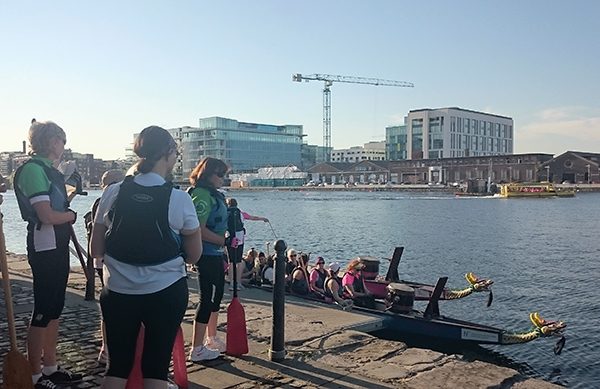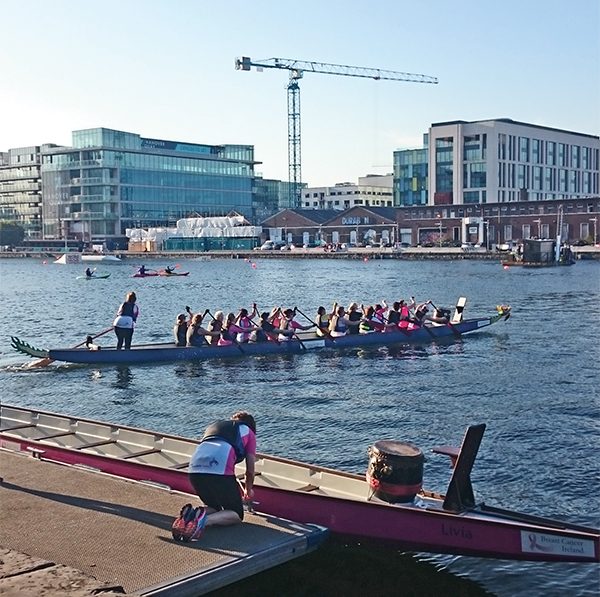
Pictures courtesy of Dara Duffy.
If you find yourself at Grand Canal Dock on a Wednesday evening or Saturday morning you may spy two dragon boats racing through the water. Don’t be alarmed, it’s not an armada landing on our shores, rather it’s the Plurabelle Paddlers out for their regular training sessions.
The Plurabelle Paddlers is Ireland’s first dragon boat racing team and its members all have a unique bond. Each one has or has had breast cancer. Margaret Mulcahy, a team member of the Plurabelles, told NewsFour that “recently a new lady said to me on her first morning ‘I don’t know anyone else who has had Breast Cancer,’ and my reply was “now you know 50 or 60 people.”
The Plurabelle Paddlers started in 2010 when Fiona Tiernan and Marian O’Dea, founding members of the team, wanted to get fit following their battle with breast cancer. Since then the team has gone from strength to strength.
With funding from the Health Service Executive and Breast Cancer Ireland, the Plurabelles have gone from just two members to now having 60+ members, two boats (affectionately named ‘Anna’ and ‘Livia’) and are coached by Julie Doyle. Julie is a member of the Great Britain Dragon Boat racing team and is the Chairman of the Irish Dragon Boat Association (IDBA), which is the governing body of the sport of dragon boat racing in Ireland. Members range from 30 to 70 years old.
Dragon boat racing has its origins in China and is a team water sport. In 1995, Dr Don McKenzie, working in the University of Columbia, launched “Abreast-In-A-Boat.” He wanted to research the effects of repetitive upper body exercise in women treated for breast cancer.
At the time it was thought that this kind of exercise might worsen lymphoedema (a swelling of the arm that may affect some women after surgery). His study involved 25 women and none of the women’s lymphoedema became worse and no new cases of lymphoedema were reported.
The use of dragon boating as a means to help women with breast cancer (and men) has now grown to 150 teams worldwide, which include teams in Cork, Waterford, Clonmel, Donegal, Belfast and Mayo.
Mulcahy tells us that, aside from fitness being a major benefit of dragon boat racing, other benefits include, “friendship, support, fun and travel. Joining the Plurabelle Paddlers has been life changing for many. We take control of our lives again through getting fit, we can see others doing well who are farther along the road. We have the support of others who have been through the same ordeal but most of all, we have fun! We have competed all over Ireland, in England, Northern Ireland, USA and Malaysia.
Once you join you are a member of a worldwide community, many of our members have contacted and paddled with BC dragon boat teams on their travels in Australia, Canada, the US and England. And we often welcome visiting paddlers.”
Mulcahy believes the team is successful because it “answers a need after cancer treatment. Most of us felt lost after treatment. We wondered, “now what?” For about a year, you are busy with medical appointments and are monitored closely by medical personnel. You feel that you are not in control of your life or your body. Gaining weight is a frequent effect of cancer treatment. You’ve lost your hair so your confidence has taken a knock.” The team provides a support network for people undergoing treatment or those in remission.
A ‘Come and Try’ evening will be held on Wednesday, June 15th at 6.30pm. Everyone is welcome and the team is particularly interested to have some men who have had breast cancer come down and join in. Mulcahy says, “they are out there but none have come to join us yet.”

Pictures courtesy of Dara Duffy.
The location is ideal for readers of Newsfour. Their clubhouse is on Hanover Quay and the boats are launched from the slipway on South Lotts Road, where the Viking Splash Tours go into the dock.
No experience is needed to join the Plurabelle Paddlers. Every active member was new to the sport and a brief training session is provided before anyone ventures out onto the water.
It should be noted, however, that the team recommends waiting a minimum of three months after completing your treatment before paddling. Medical advice should also be sought. But people in this recovery period are invited to join the team at their clubhouse after training for tea and chats. You don’t need any equipment to try it out as you will be given a buoyancy aid and paddle for the session.
When asked what is the best thing about being a member, Mulcahy’s response is heartwarming: “Friendship! Having cancer is a very levelling experience. The friendships formed are very sincere and honest. Finally, above all, we have fun.”
If you are interested, let the Plurabelles know that you are coming by dropping an e-mail to newmembers@plurabellepaddlers.com
By Marguerite Reilly



